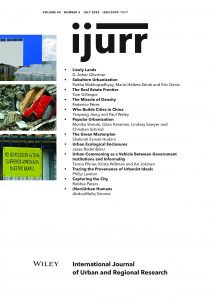In this essay, I undertake a critical analysis of the UN‐Habitat publication, The Quito Papers. I begin by unpacking the representation within The Quito Papers of the Charter of Athens of 1941 as an outcome of CIAM IV in 1933. Here, the ways in which the authors centralize the Charter of Athens within their critique of contemporary urbanization is critically analysed. Ultimately, I argue that what emerges is a simplification of the complex intertwining of urbanization and urbanist ideals. Based on this, I situate what is presented in The Quito Papers as alternative imaginaries—centred largely on European ideals of urbanism—within the context of urban change since the 1970s. This includes a discussion of the manner in which these ideals are promoted within urbanist discourse, including the role of the authors themselves in their engagement with UN‐Habitat. Finally, I situate some of the arguments contained in The Quito Papers within current debates in urban theory. I contend that the relationship between processes of urbanization and the ideals of modernist urbanism are more genealogical than direct. Furthermore, I argue that it is through this relationship that broader power dynamics and their resultant inequalities can be further examined and challenged.

